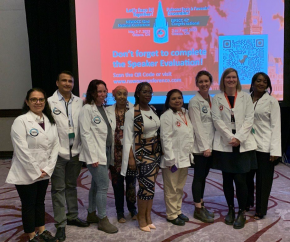Strengthening quality of care | Nurses across our Ontario long-term care homes receive specialized skin and wound care training
We're happy to announce that 22 nurses at our Ontario long-term care homes have graduated from a specialized training program for skin and wound care, ostomy, and continence management, expanding our advanced practice capacity in this critical area of seniors’ health care.
The Skin Wellness Associate Nurse (SWAN) Program was completed by these nurses, enabling them to offer more specialized care to residents in need.
Jennifer Bilbie, Registered Nurse (RN), National Clinical Education Manager at Extendicare, and a skin and wound specialist, has helped lead the training and was instrumental in helping RNs and RPNs at Extendicare enrolled in the SWAN program attain their certification.
“The focus is prevention rather than a reactive medical model of care”, said Bilbie. “If we can keep the skin intact, we do not have a wound. The point of this program is to ensure we look at all the potential risks and address the underlying causes, to prevent skin wounds before they happen. Extendicare is taking the lead in this. As the first long-term care operator in Canada to invest in an advanced education program for wound, ostomy, and continence, Extendicare is proud to have nurse leaders who are true clinical experts in this area."
Extendicare collaborated with the Wound, Ostomy, and Continence Institute, operated by the Nurses Specialized in Wound, Ostomy, and Continence Canada (NSWOCC), to bring its Canadian Nurses Association-accredited SWAN ™ Program training to Extendicare.
NSWOCC provides national leadership in wound, ostomy, and continence care, promoting high standards for practice, education, research, and administration to achieve quality specialized nursing care.
Two Extendicare RPNs who have graduated from the SWAN program spoke with us about some of their takeaways from the training.
Shannon Murphy, RPN at Extendicare Laurier Manor, has been the wound care champion at the home for years. However, the SWAN ™ Program has provided her with additional knowledge and training that allows her to more confidently recognize wound and ostomy issues and make treatment recommendations in-house for residents.
“Residents benefit by not having to wait to see a Nurse Specialized in Wound, Ostomy, and Continence for impaired skin issues. Now staff nurses can consult with me, and I am able to make recommendations immediately. My residents truly benefit from my knowledge but more importantly how confident knowledge has made me,” she said.
“Skin care in seniors is critical because proper care aids in the prevention of chronic wounds. Wound care lowers the risk of serious infection. Wound prevention and effective treatment of wounds is essential for quality of life for our residents.”
Effective skin and wound care is a collaborative effort and everyone has a role to play in proper skin and wound care for residents, said Shannon.
“It starts with our personal support workers," she said. “They are the first set of eyes to spot issues and our first line of defense. Next is the registered staff who implement treatment plans. Physicians order medications and advanced treatments when necessary. Our housekeeping and support services keep our residents’ environment clean, tidy and safe. The dietary department ensures that our residents have a healthy diet which is essential to good health and especially skin health. Educating the whole team as to how important their role in skin care is vital. Every role has a part to play in effective skin care."
Education in effective skin and wound care prevention and treatment is essential because seniors have more delicate skin. It’s especially important for PSWs to learn it because they provide hands-on care, according to Christine Lepage, RPN at Extendicare Southwood Lakes.
“The aging population’s skin is more fragile. I could grab your hand and it doesn’t hurt you, it doesn’t affect you. But, with an aging population, it could bruise them. It can give them a skin tear because their skin is that much more fragile than a younger person.”
Extendicare will continue to expand this training program, in collaboration with the Wound, Ostomy, and Continence Institute. More team members are expected to graduate from the program next year.
